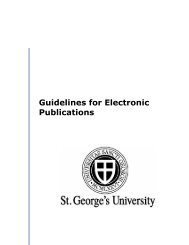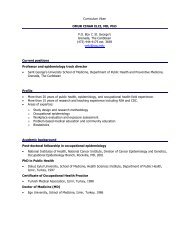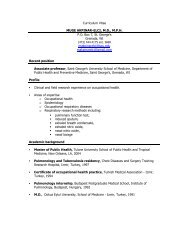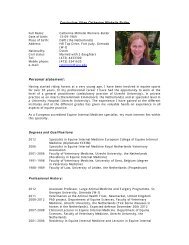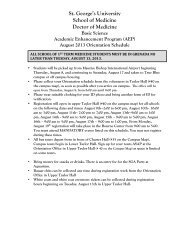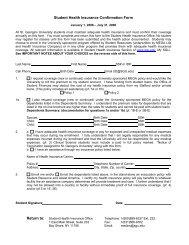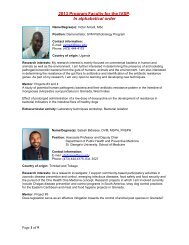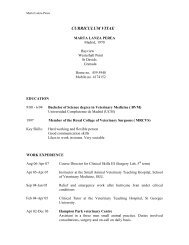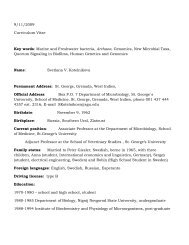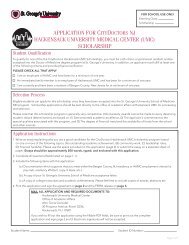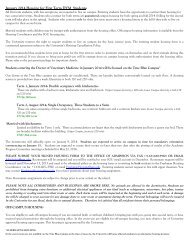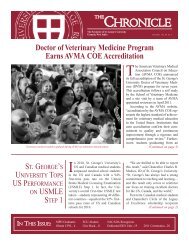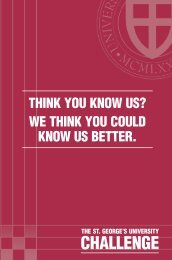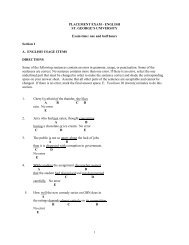SCHOOL OF 2012-2013 - St. George's University
SCHOOL OF 2012-2013 - St. George's University
SCHOOL OF 2012-2013 - St. George's University
Create successful ePaper yourself
Turn your PDF publications into a flip-book with our unique Google optimized e-Paper software.
integration of each in the practice of medicine. The course<br />
focuses on three areas: the evidence base of practice,<br />
community aspects of practice, and clinical preventive<br />
services and health promotion. Themes running throughout<br />
the course will include the scientific foundation upon<br />
which practice guidelines and recommendations are made,<br />
the role and contribution of both clinical and community<br />
prevention efforts, and the applicability of these topics to<br />
the practicing physician. The principles of community and<br />
preventive medicine will be illustrated using examples from<br />
a wide range of health topics such as child health, health<br />
of the elderly, health disparities, infectious and chronic<br />
diseases, and health topics in the news. The overarching<br />
goal of this course is to demonstrate that community<br />
medicine and preventive medicine can be and should be an<br />
integral part of the practice of medicine.<br />
• Online Course Management System<br />
<strong>St</strong>udent learning is facilitated by an electronic course<br />
management system, where course materials and<br />
supplemental materials can be reviewed online, and<br />
students can take self-assessment quizzes and participate<br />
in discussions for each of the lecture modules.<br />
Selectives<br />
Selectives are offered to basic sciences students during<br />
the first two years of the four-year medical program. The<br />
objective is to provide a structured learning experience<br />
in diverse clinical and scholarly areas. They give students<br />
the opportunity to integrate Basic Sciences knowledge<br />
into clinical areas and may provide a transition into clinical<br />
medicine. Selectives are offered by various departments<br />
and coordinated through the Office of the Dean of Basic<br />
Sciences. There is a cost associated with some of the<br />
following electives.<br />
ELEC 524<br />
Culture and the Practice of Medicine<br />
Diana <strong>St</strong>one, MPH, DVM, PhD<br />
Health care practitioners have become increasingly aware<br />
of the significant impact of cultural beliefs and practices<br />
on health, illness and disease. This course is designed for<br />
both human and veterinary medical students. The goal of<br />
this course is to enable students to identify cultural beliefs<br />
and practices that impact disease in human and animal<br />
populations and the practice of human and veterinary<br />
medicine. <strong>St</strong>udents will understand the concept of “One<br />
Health One Medicine” and will incorporate cultural aspects<br />
and interdisciplinary approaches to health care problem<br />
solving. <strong>St</strong>udents will use cultural knowledge, including an<br />
understanding of their own cultural beliefs and practices,<br />
to improve their ability to effectively practice medicine.<br />
SCSK 500<br />
The Prague Experience in Medicine<br />
Walter Kolbinger, PhD<br />
Martin <strong>St</strong>ransky, MD<br />
This popular two-credit selective takes place in Prague<br />
in the Czech Republic during the last three weeks of July.<br />
<strong>St</strong>udents are introduced to three teaching hospitals and<br />
a private practice clinic with 25 physicians. The students<br />
gain exposure to both adult and pediatric settings, and<br />
participate in team discussions, teaching rounds, lectures,<br />
and direct patient interaction. The thinking process that<br />
clinicians use when examining patients is introduced and<br />
discussed. <strong>St</strong>udents assess the medical, cultural, and<br />
economic forces impacting different medical systems. After<br />
this selective, students will have developed an increased<br />
awareness of the globalization of medicine, expanding their<br />
perspectives and knowledge bases in patient care.<br />
SCSK 501<br />
Speech Skills for Professionals<br />
Bill Blunt, DEd<br />
The selective is an online communication workshop<br />
designed to provide the techniques and concepts needed<br />
to improve students’ communication skills as professionals<br />
in today’s US marketplace. The acquired speaking skills<br />
will improve performance in interviews, presentations, and<br />
interactions with colleagues and peers. Emphasis will be<br />
placed on preparation, body language, and image. Essential<br />
to competing in the US job market today is the ability to<br />
convey information and concepts distinctly without language<br />
barriers. To this end, this workshop will enhance students’<br />
English pronunciation while reducing foreign accents. In<br />
addition, students will learn the factors that influence<br />
their speech qualities, such as verbal debris and volume.<br />
Throughout the one-credit course, each student will have<br />
opportunities to hear his/her voice through recordings and<br />
engage in self-critique in order to become acutely aware of<br />
modifications. Once identified, students will work through<br />
practice exercises and find solutions in online discussions<br />
and resources to rectify errors.<br />
School of Medicine<br />
Course Descriptions<br />
School of Medicine Catalog <strong>2013</strong>–2014 | 65



